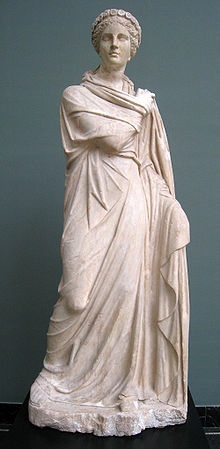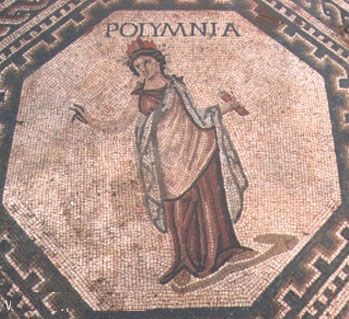MagickalArts
(en)LIV(en)ING with the Muses:The Hymns of Polyhymnia

(Image: Sculpture from the State Hermitage Museum)
This is the Sixth posting of the (en)LIV(en)ING with the Muses Series
Each time I have lost myself in the beauty of music, Polyhymnia has been whispering in my ear. Her name is derived from the Greek, “poly” meaning “many” and “hymnos” which means “praise. Her name is alternately spelled Polymnia. She is attributed with many gifts and depending on the territory of Greece that she oversaw, her garb and visage was adapted. Her primary creativity flowed through music, song and dance and in the more traditional sense she became the muse specifically of religious hymn and praise.
Unlike her sisters, Polyhymnia was depicted as more pensive in her demeanor and of an almost meditative and spiritually charged seriousness.
She was a daughter of Zeus and Mnemosyne, the Titan Goddess of memory and remembrance as well as attributed as the inventress of language and words. What more beautiful expression of her mother’s gifts than to be the child that brings adeptness and creativity to the sacred words of devotion and hymn.
Polyhymnia was consort of Oeagrus, the King of Thrace. In some myths he and Calliope or Clio were the parents of Orpheus. In others, Polyhymnia is appointed as the mother of Orpheus. This gives testament to the cross over and threads of community that the Muses held. All having many of the same gifts, but their expression and who they were attached to in the mortal realms meant that as mothers or aunts, the shared the parenting of many of the offspring attributed to one muse or another.
In other myths she is identified as the mother of Triptolemus, the first priest of Demeter and inventor of agriculture and working the lands. This birth was by her union with Cheimarrhus, the son of the Greek God Ares.

(Greco-Roman mosaic from Vichten C3rd A.D.. National Museum of History and Art)
The Greek Historian, Diodorus Siculus writes…
“Polyhymnia, because by her great (polle) praises (humnesis) she brings distinction to writers whose works have won for them immortal fame…” 1.
Not much has been written of Polyhymnia, in contrast to her sisters. Nonetheless, she remains a muse whose essence continues to flourish with each writing and composition of any work of devotion. So the next time you are inspired by song or feel the rising of your Soul’s desire in response to music’s harmonious flow, offered up gratitude to Polyhymnia as she whispers gently in your ear.
The next post will focus on the Muse, Urania and her Gifts of Astronomy
References:
1. Diodorus Siculus, Library of History books III-VIII (trans. Oldfather) (Greek historian C1st B.C.).
***
About the Author:

Robin Fennelly is a Wiccan High Priestess, teacher, poet and author.
She is the author of:
The Inner Chamber, Vol. One
It’s Written in the Stars
Astrology
The Inner Chamber, Vol. Two
poetry of the spheres
Qabalah
The Inner Chamber, Vol. Three
Awakening the Paths
Qabalah
A Year With Gaia
The Eternal Cord
Temple of the Sun and Moon
Luminous Devotions
Click on Image for Amazon Information
The Magickal Pen, Volume One
A Collection of Esoteric Writings
The Elemental Year
Aligning the Parts of SELF
The Enchanted Gate
Musings on the Magick of the Natural World
Click on Image for Amazon Information
Sleeping with the Goddess
Nights of Devotion
A Weekly Reflection
Musings for the Year
Her books are available on Amazon or on this website and her Blogs can be found at: Robin Fennelly
Follow Robin on Instagram & Facebook.

